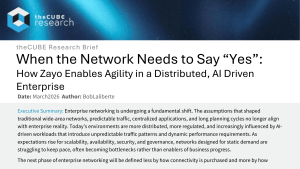Our 2025 Predictions series explored the transformative and sometimes daunting intersection of application development and cybersecurity. Industry veteran Jackie McGuire joined host Paul Nashawaty for this dynamic discussion, sharing her extensive real-world insights. Together, they uncovered key trends and strategies shaping the future of app development and cybersecurity.
Let’s dive into the highlights and predictions for 2025:
1. AI: Friend or Foe?
Artificial intelligence is revolutionizing application development. From automated coding to intelligent testing, AI tools promise to reshape software development dramatically. However, as the episode highlights, blindly replacing developers with AI is risky.
AI excels at repetitive tasks and optimizing processes, but it lacks human ingenuity, critical thinking, and nuanced decision-making. These qualities are essential for tackling complex problems and fostering true innovation. The future lies in AI-augmented development, where developers leverage AI to amplify their capabilities while maintaining oversight and control.
Research from theCUBE supports this vision. Their analysis reveals that organizations implementing AI in development workflows saw a 25% reduction in time spent on repetitive tasks. Still, those who combined AI with human oversight achieved 40% better project outcomes.
2. DevOps: The Rise of Unified Platforms
Fragmentation of Traditional DevOps tools creates inefficiencies and complicates workflows. In 2025, we anticipate a significant shift towards unified DevOps platforms that streamline processes, improve integration and reduce operational overhead. However, the contrast to the gain in efficiency is an increased need for effective Identity and Access Management (IAM) and Role-Based Access Control (RBAC) to ensure that the concentration of enterprise data on a single platform doesn’t also concentrate risk.
Unified platforms offer end-to-end visibility, enabling teams to manage development, deployment, and monitoring from a single interface. When secured effectively, platform solutions stand to impact productivity meaningfully. According to theCUBE research, companies adopting unified DevOps platforms have seen up to a 30% acceleration in delivery cycles and a 20% improvement in operational stability.
3. Developer Productivity: Breaking Free from the Bottleneck
One of the most pressing challenges in app development is the “productivity gap.” Developers often spend significant time on non-coding tasks like documentation, meetings, and design reviews, which stifle innovation and slow delivery. Once completed, developers often have to send their work through their Security counterparts to ensure it meets expected standards. This process can often lead to a back-and-forth, sometimes resulting in frustrated development teams taking security shortcuts
The solution? Automation. By automating routine and time-consuming tasks, organizations can free developers to focus on writing high-quality, innovative code. For example:
- Automated code reviews.
- Intelligent documentation generation.
- Streamlined collaboration tools.
- Secure code co-pilot to highlight issues in-line.
- Automated blue and red teaming.
Studies show that teams leveraging automation tools reported a 50% increase in time spent on core development tasks, according to theCUBE’s latest findings.
4. Secure DevOps: No Longer Optional
In today’s landscape, cybersecurity must be integrated into every development lifecycle stage. Secure DevOps—or DevSecOps—is no longer optional.
Key practices include:
- Automated vulnerability scanning: Identifies security issues early, reducing remediation costs.
- Continuous compliance monitoring: Ensures applications meet rigorous security standards.
- Developer security training: Empowers teams to build secure code from the ground up.
Data from theCUBE underscores this necessity: companies that implemented DevSecOps practices experienced a 40% reduction in security incidents and a 25% faster time-to-recovery when breaches occurred.
5. Low-Code/No-Code: Empowering Citizen Developers
Low-code and no-code platforms democratize app development, enabling non-developers—or “citizen developers”—to create simple applications. This trend reshapes how organizations approach app development but also brings unique challenges.
Opportunities:
- Increased agility.
- Faster time-to-market for simple applications.
- Reduced dependency on professional developers for routine tasks.
Challenges:
- Ensuring governance and security.
- Managing integrations with complex enterprise systems.
- Maintaining oversight to prevent shadow IT.
- Establishing comprehensive training and enablement programs ensures all employees understand security and data best practices.
theCUBE’s research reveals that organizations effectively leveraging low-code/no-code platforms achieved 35% faster deployment rates while avoiding operational pitfalls by establishing clear governance frameworks.
A Detailed Outlook for 2025
Significant advancements and challenges will mark the application development and cybersecurity landscape in 2025. Here are key expectations supported by industry data:
- AI Adoption: Over 70% of enterprises are projected to integrate AI into development workflows, with hybrid approaches that combine human oversight expected to yield the highest ROI.
- Unified Platforms: The global market for DevOps platforms is forecast to grow at a CAGR of 18.6%, driven by demand for seamless integrations and operational efficiencies.
- DevSecOps Integration: By 2025, 65% of organizations are expected to adopt DevSecOps practices, focusing on automation and continuous security monitoring.
- Low-Code/No-Code Growth: The low-code/no-code market is projected to reach $45 billion, fueled by increasing demand for faster application delivery and business agility.
- Cybersecurity Spending: Global cybersecurity spending is expected to exceed $250 billion as organizations prioritize secure software development and compliance.
These trends underscore the need for organizations to embrace innovation while proactively addressing security and governance challenges.
The Bottom Line
The future of application development is bright and complex. By responsibly embracing AI, consolidating DevOps tools, prioritizing developer productivity, and integrating security throughout the development lifecycle, organizations can build secure, innovative applications that drive business success in 2025 and beyond.
What are your thoughts on these predictions? Are you ready to embrace the changes and challenges of 2025? Share your comments below!



